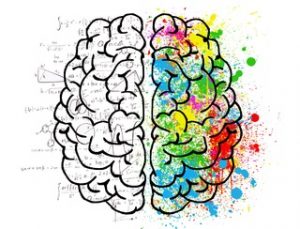TAPP Radio Ep. 14 TRANSCRIPT
Are Learning Styles Real? Why or Why Not?
The A&P Professor podcast (TAPP radio) episodes are made for listening, not reading. This transcript is provided for your convenience, but hey, it’s just not possible to capture the emphasis and dramatic delivery of the audio version. Or the cool theme music. Or laughs and snorts. And because it’s generated by a combo of machine and human transcription, it may not be exactly right. So I strongly recommend listening by clicking the LISTEN button provided.

Episode 14 Transcript
Are Learning Styles Real? Why or Why Not?
Introduction
Kevin Patton: Have you ever had a student tell you that they couldn’t learn something because you weren’t presenting things in a visual manner, or an auditory manner, or a kinesthetic manner, and therefore it didn’t match their learning style? Well if so, or even if not, you’re gonna want to listen to our discussion on learning styles, are they real?
Aileen: Welcome to the A&P Professor, a few minutes to focus on teaching human anatomy and physiology with host, Kevin Patton.
Kevin Patton: In this episode I revisit the idea of neurogenesis occurring in adults, I once again invite you to the HAPS annual conference, and I discuss learning styles.
Can adult brains make new neurons? (revisited)
Kevin Patton: Like many of you, I enjoy reading and hearing about science history. One of the thoughts that often occurs to me as I do so is, boy, what would it have been like back in the olden days when some of these central theories of science were first introduced, and were very controversial, and there was fighting among the big names in science, back and forth? Would I have been a early supporter of Darwin, or not? Would I have been an early supporter of Mendel’s ideas about genetics, or not? You know what? It’s still happening. I don’t have to go back in a time machine to have that kind of experience. As a matter of fact, we’re seeing it unfold right now in this very podcast. In a recent episode I brought up a paper that was published that was getting a lot of traction, that seemed to show that neurogenesis, the production of new neurons in the hippocampus of the adult brain, wasn’t really happening anymore.
Kevin Patton: That flew in the face of some earlier ideas that, yeah, neurogenesis can and does continue to happen in the adult. That, in turn, flew in the face of even earlier ideas that, no, it can’t. So you know, it’s, no, no, you can’t have neurogenesis in the adult. And then yeah, yeah you can. And then, no, no you can’t. And now a even more recent paper has come out where, yeah, yeah you can. This particular paper came out in Cell Sem Stell Journal. Did I say sem stell? It came out in the Cell Sem … Oh man, that’s hard to say. Cell Stem Cell Journal. There, I got it. It’s entitled, Human Hippocampal Neurogenesis Persists Throughout Again. So I think you know the answer that they came up with. They were looking at a bunch of autopsied hippocampuses that were in a wide range of individuals from age 14 to 79 years old.
Kevin Patton: They looked at the neuro progenitor cells, and immature neurons that were found in these various brains of the individuals. They basically concluded a couple of important things. One is that older individuals have less angiogenesis … That is, making of new blood vessels … and less neuroplasticity, and they have a smaller number of progenitor neurons in certain areas of the hippocampus. But overall, they concluded that healthy older subjects without cognitive impairment or neuropsychiatric disease or treatment, they do display preserved neurogenesis. They conclude, also, that it’s possible that this ongoing hippocampal neurogenesis sustains human specific cognitive function throughout life, and declines may be linked to compromised cognitive emotional resilience.
Kevin Patton: We’re still kind of going back and forth on this, aren’t we? It’s a lot of fun. I think it’s fun. And it’s important, because it’s a question that really needs to be answered so we can be better at understanding neuroscience, and also be better at possibly treating various neurological issues, especially those related to aging. If you want to know more, check out the hyperlinks that I have provided in the show notes, and also on the episode page at theapprofessor.org.
See you at HAPS 2018?
Kevin Patton: Well, it’s coming right up, the Human Anatomy and Physiology Society, or HAPS, is having their annual meeting in Columbus, Ohio soon, and I plan to be there. I know those of you that have been to HAPS annual conferences before are doing everything you possibly can to get there too. But for those of you that have never been, I want to encourage you, once again, to really, strongly think about going. Now I know it’s on Memorial Day weekend, and they often are on Memorial Day weekend. I know it takes some sacrifice to get there, but it really, really is worth it. By the way, a lot of people do bring their families and make a vacation of it, so that’s an option too. But do please come and say hi to me. I’ll be there at the opening reception. Please don’t skip that, because it’s a good way to have a really good initial experience of HAPS, because that’s where people go to meet the new people and seek them out and introduce themselves.
Kevin Patton: I’ll be there, so look for me. If you don’t know what I look like or can’t see where I’m at, just ask around. There are a lot of people there that know me, mainly because I’ve been going there for a long, long time. This is going to be my 29th consecutive HAPS conference that I’m attending, and then I’ll be there again the following morning for the first timer’s breakfast. Don’t skip that either, because we always get good food, and even more importantly, you’ll get to meet some of us old timers. … was originally hosted by those of us that are past presidents, but we usually get so many new people these days that we’ve expanded that to other leaders within HAPS, and so you’ll get to meet some of the movers and shakers within HAPS. We’re the folks that can answer a lot of the questions that you might have at the beginning. But it won’t be long before those initial introductions at the opening reception and first timer’s breakfast expand rapidly, and you’re gonna get a chance to meet a lot of the people that are at the meeting.
Kevin Patton: Not only that, you’ll get to meet the many vendors that go there. A lot of the book publishers and suppliers and different folks that support us in our teaching of anatomy and physiology. They love going to HAPS too. Not only cause we’re fun crowd, but also because we usually come with lots of questions to ask. Sometimes they’re the hard questions, and that really keeps the vendors engaged and on their toes, and they love it. So make sure you do that. As I have mentioned in past episodes, the first couple of days also include speakers that are going to update us in various areas of basic science, and in clinical applications. It’s during that time that we have our annual business meeting, so you’ll want to certainly come to that to see what’s happening in HAPS and perhaps cast a vote to decide the future happenings in HAPS with various proposals that are sometimes put forth at those meetings.
Kevin Patton: The next couple of days are spent at the host institution. There’s all kinds of workshops going on. I will warn you ahead of time, it’s gonna be very difficult to choose which one to go to cause there’s so many good ones available. This is where we the members get to sort of share things with each other about what has worked or not worked in our various classes. Some of the vendors are demonstrating some of the products and services they have, and there’s sometimes a few people outside of HAPS that come to share various ideas with us as well. Lots of variety there, you will not be disappointed. Of course there’s some lunch times and break times that provide additional opportunities to network, and that is certainly one of the big, big things about HAPS that I particularly love is, I’ve made so many good friends there. I know that there are people throughout North America and beyond that I can call when I have particular questions, and get their advice on how to handle this new thing I’m gonna try in my class or that new thing they’re gonna try in my class.
Kevin Patton: A couple of ways to learn more, one is to go to hapsweb.org, I have the link in the show notes and on the episode page if you didn’t quite catch that. If you go to hapsweb.org, just click on the events tab and that’ll lead you to the conference. I’ll have a direct link to the conference webpage as well in the show notes. Or another place you can look is, I’d just recently heard this episode, there’s another podcast about A and P out there that I recommend, that my friend, Jim Connelly over at McGraw-Hill puts out, it’s called Succeed in A and P.
Kevin Patton: One of his recent episodes featured a pretty lengthy interview with Peter English, who is the executive director of HAPS. They really touched on some of the points I’ve already touched on here and in previous episodes of my podcast, but they go into a little bit more detail, and I highly recommend listening to that episode. I’ll have a link to that in the show notes as well. I hope I see you there. Please do, please, please, please come and say hi to me, and let me know that you’re listening to the podcast, and I really do appreciate your support.
Featured topic: learning styles
Kevin Patton: You may have heard the recent buzz in the mainstream press about learning styles, are they real? Well, my answer to that question is, yes, they are real. But no, they’re not. What in the world do I mean by that? Well, I’m gonna start out with referring to the journal article that created all that recent buzz. It was published in the Anatomical Sciences Education Journal that is put out by The American Association of Anatomists. It was written by Polly Husmann and Valerie O’Loughlin, and it’s entitled, Another Nail in the Coffin for Learning Styles? Disparities Among Undergraduate Anatomy Students’ Study Strategies, Class Performance, and Reported VARK Learning Styles. Now, that term VARK, if you’re not familiar with it, is an acronym that refers to a system of learning styles first proposed by Fleming and Mills way back in 1992. The V stands for visual, the A stands for auditory, the R stands for reading and writing, and the K stands for kinesthetic.
Kevin Patton: The original idea of this system was to find a way to start the conversation, start the thinking process about how individual learners process information, how they learn that information, how they remember that information, and that would be a stepping stone to some effective metacognition, thinking about how we think, and therefore making good choices about how we study and what strategies we use in teaching and learning. But in real life what has happened during the time it was since proposed, it has become used as this diagnostic tool that puts students into what have turned out to be some pretty rigid categories, and used in some ways that I don’t think are necessarily very logical. Just to explain what I mean by that, let’s look at two sides of the same coin. One is the student side, where a student may take a quiz or some other instrument which will identify them as being one of the four primary VARK learning styles, such as visual or auditory, and let’s say it turns out that they’re identified as a visual learning.
Kevin Patton: Well, a lot of students, not just a few, but a lot of students will then take the next step, which they think is logical, and that is that, if I’m a visual learning, then it’s no use for me to do anything auditory or reading or writing, whatever. I don’t have to read the assigned reading because it’s not gonna do me any good. I’m a visual learning, I’m gonna look at the pictures, that’s all I need to do. I’m not gonna listen to the explanation. Why would I do that? I’m not an auditory learner. I know that sounds weird, but students really do that. Now, maybe they don’t take it quite to that extreme, although I’ve seen a lot of students who do. They might take it only part way. But either way it does harm. They even will verbalize things, like, “Well, I can’t really learn that well because you teach in a visual way and I’m an auditory learner.”
Kevin Patton: Really? I mean, we know that a lot of us like to look at areas in which we’re failing and try to blame somebody else, I guess. Or try to explain it away, and find some kind of rational instead of just pushing through it and trying to get it. So this has become sort of an excuse for a lot of students for why they’re not learning, and it’s just not a good excuse. Or maybe I should say it’s not a valid excuse. But the other side of that same coin comes from the teaching side, and even administrators get in on this and get the idea that, “Wow, I have these four learning styles represented in my class. You know, any one class is likely to have all four students with any of the four learning styles represented there. So I’d better make sure that I’m not just presenting visual resources and visual strategies of learning, because then I’m going to leave behind all my auditory learners. So I need to have an equal amount and quality of auditory resources and strategies built into my course so they can have a chance at learning too.
Kevin Patton: We can do that for all four learning styles. That, I believe, is taking the same misinformation or misinterpretation out to that extreme degree, and also doing harm. Getting back to this paper, what the authors did was go through some of that history of the VARK learning style system, and how it developed, and how it’s been misapplied, and then they did some really nice experimentation where they looked at the learning styles of their students, they compared that to their learning outcomes, they compared that to the strategies that the students were actually using to learn, and then looked at various strategies to see which ones were correlated with success in the class, and which ones were not so correlated with success in the class. What they ended up with was showing that the learning styles really didn’t do anything. They really didn’t help.
Kevin Patton: I strongly suggest that you read the paper. It’s a very thorough paper, in many ways. It’s very clearly written so it’s easy to read and easy to get through, and I think it really does help each of us as readers think about and understand what the issues are with using a [inaudible 00:16:38] system of learning styles. Now they focus on the VARK learning styles. Oh, by the way, I do have a link to the article in the show notes for this episode. If your app that you’re listening on shows those links use that, and if not, go to the episode page and you’ll get the link there. But getting back to, my point here is that even though they focus on the VARK learning styles, I think it applies to any learning style. And there are other systems of learning styles. For example, there’s one very similar to VARK that adds a few more learning styles, for a total of seven. Besides the VARK styles, they add on a logical or mathematical style, a social or interpersonal style, and then a solitary or intrapersonal style.
Kevin Patton: That’s one learning style system that’s commonly used, but I think it has some of the same issues, that yeah, if you just take it for what it was originally intended, and that is, is a stepping stone for metacognition, thinking about how we think, and getting students to think about how not only they think, but how they learn and how they study, then yeah, okay. But the danger in doing that is what I’ve just mentioned, and that is, you get too rigid in that. It gets too, too rigid. Whenever I think of this I go back to the olden days when it was very popular to talk about left brain learners and right brain learners. There was a period of time during which I was going to a lot of teaching workshops and taking mini courses in teaching and learning, and it was very popular to, at the beginning of such an event, take a little quiz and self identify as a left brain learner or right brain learner.
Kevin Patton: There were some where we were asked to either raise our hands, or stand at different ends of the room and identify ourselves as being left brain or right brain learners. Now, I question the advisability of having students force themselves to identify any kind of category that they are a part of, but it was worse for me in that case, because what would always happen is, I’d end up exactly on the cusp of left brain, right brain. So when we were asked to stand at different ends of the room, there would be Kevin, sitting in the middle of the room, not on either side. Of course, the presenter would think, “Oh my gosh, we got another trouble maker here.” They wouldn’t be wrong in thinking that, but not for the reason they thought. The reason I didn’t go to either side is cause I didn’t belong on either side. I guess I’m not a left brain or right brain learner, if you’re going by that system.
Kevin Patton: Of course, the logical conclusion is, Kevin has no brain. That may not be all that far from the truth either, but the point is, that it’s a learning style system, and it’s not a valid learning style system. It may not be bad to think about, “Am I more logical, or am I more intuitive?” Yeah, okay, that’s not a bad question to ask. Just like in the VARK system, it’s not a bad question to ask. Am I more visual, or am I more kinesthetic? Are there some kinesthetic things I can think of that might be more enjoyable for me? I think that’s where the value of learning styles lies, and that is, does it help us self-identify, or does it help us as instructors assist a student in identifying how they think, how they learn, how they remember things, what their preferences are?
Kevin Patton: There is some research that shows if we’re more comfortable in our learning, least in certain ways, if we’re more comfortable in our learning, if we enjoy the learning, then we’ll probably learn more, or learn more effectively, or learn for the longer term. Now there’s a flip side to that too, because if there’s no struggle whatsoever, then what are you learning? So there’s got to be some discomfort there, and you get past that discomfort, and the way you get past it is by mastering something that you had not mastered earlier. So you know, it’s not totally about comfort, but there is a kind of comfort that if you have choices … And we do. Not only do we have choices in the way we teach things, but students have choices in the way that they study.
Kevin Patton: As the authors of the study I mentioned point out, and I totally 100% agree with, we need to do a lot more work in learning science to really validate the different kinds of strategies there are out there, and also work on ways to match up learning styles with individuals. Cause if there’s anything I’ve learned over the decades I’ve been teaching and working with a wide variety of different people, a wide variety of different learners, and that is, there are a lot of differences from one individual to the next in the way they learn best, and in the way they process information. What we as teachers need to do is find those strategies that work best for the most people, and then assist individual students in finding strategies that help them as individuals.
Kevin Patton: This is an interesting topic. If you have any feedback or rebuttal or anything else, then give us a call on the podcast hotline. I just said give us a call. It’s just me. Yes, I’m not using the royal we here. It guess I just do that out of habit, I don’t know. But give me a call on the podcast hotline. Well no, it’s us, because if I use it on the show, then all of us will be able to hear what you’re saying. The podcast hotline is, 1-833-LIONDEN, that’s L-I-O-N-D-E-N. You can also give us feedback or rebuttals, or your favorite learning style story, that’d be fun to listen to at podcast@theapprofessor.org.
Aileen: The A and P Professor is hosted by Kevin Patton, professor, blogger, and textbook author in human anatomy and physiology.
Kevin Patton: This episode was recorded in Studio 1A, um, in my basement.
Stay Connected
The easiest way to keep up with new episodes is with the free mobile app:


Or you can listen in your favorite podcast or radio app.
Click here to be notified by blog post when new episodes become available (make sure The A&P Professor option is checked).
Call in
Record your question or share an idea and I may use it in a future podcast!
Toll-free:
1·833·LION·DEN
(1·833·546·6336)
Local:
1·636·486·4185
Email:
podcast@theAPprofessor.org
Share




